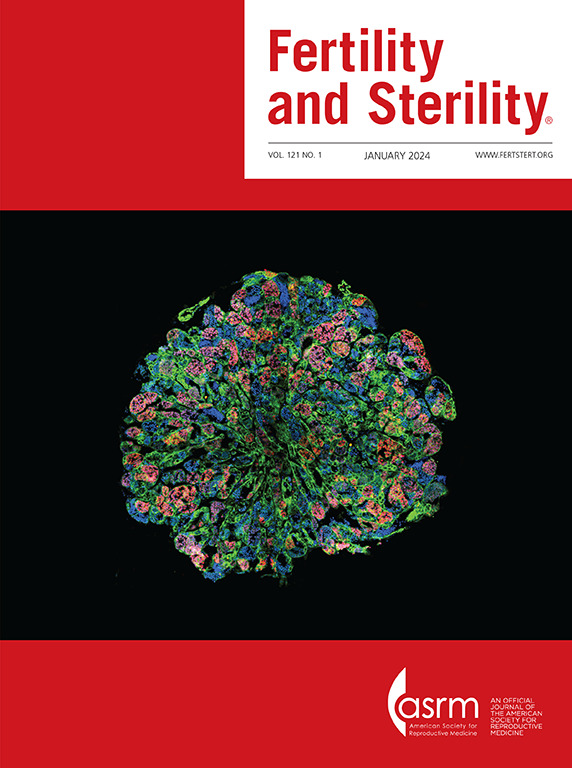Chromosomal abnormalities in oocyte donor candidates: a French survey of over 8,200 karyotypes
IF 6.6
1区 医学
Q1 OBSTETRICS & GYNECOLOGY
引用次数: 0
Abstract
Objective
To study karyotypes of >8,200 oocyte donor candidates in nulliparous or multiparous women compared with a reference population.
Design
A retrospective observational multicentric study.
Subjects
The study included 2 cohorts of oocyte donor candidates recruited between January 2005 and October 2021: multiparous women with at least 1 child at the time of recruitment and nulliparous women. Both were compared with a reference population composed of female newborns from literature.
Exposure
Not applicable.
Main Outcome Measures
Blood lymphocyte karyotype.
Results
A total of 8,229 oocyte donor candidates from 22 fertility centers were included in this study. Nulliparous (n = 1,890) and multiparous (n = 6,339) women were compared with 8,102 female newborns. Overall, 65 candidates were carriers of chromosomal abnormalities and were, therefore, excluded from the donation process (0.79%; 95% confidence interval [CI], 0.60–0.98). The occurrence of balanced structural chromosomal rearrangements globally increased in the study population (0.49%; 95% CI, 0.34–0.64) compared with that in female newborns (0.24%; 95% CI, 0.34–0.64). The number of reciprocal translocations increased fivefold in nulliparous oocyte donor candidates (0.37%; 95% CI, 0.10–0.64). The incidence of sex chromosome mosaicism notably increased in multiparous oocyte donor candidates, with 17 cases (0.27%; 95% CI, 0.14–0.40). Among chromosomal aberration carriers, only 2 nulliparous women (1 reciprocal translocation and 1 sex chromosome mosaicism) had fertility issues with a diagnosis of premature ovarian failure.
Conclusion
In this comprehensive 16-year French experience of karyotyping in oocyte donor candidates, we confirmed an increased incidence of balanced structural chromosomal rearrangements, especially among those without children at the time of recruitment. Karyotyping could be considered to identify any chromosomal abnormalities that may not be easily detectable through medical questioning. These abnormalities pose an inherent genetic risk for gamete recipients if left undetected.
Anomalías cromosómicas en candidatas a donantes de ovocitos: un estudio francés sobre más de 8,200 cariotipos
Objetivo
Estudiar los cariotipos de > 8,200 candidatas a donantes de ovocitos en mujeres nulíparas o multíparas en comparación con una población de referencia.
Diseño
Estudio multicéntrico observacional retrospectivo.
Sujetos
El estudio incluyó 2 cohortes de candidatas a donantes de ovocitos reclutadas entre enero de 2005 y octubre de 2021: mujeres multíparas con al menos 1 hijo en el momento del reclutamiento y mujeres nulíparas. Ambas se compararon con una población de referencia compuesta por recién nacidas de sexo femenino de la literatura.
Exposición
No aplicable.
Principales medidas de resultado
Cariotipo de linfocitos sanguíneos.
Resultados
En este estudio se incluyeron 8,229 candidatas a donantes de ovocitos de 22 centros de fertilidad. Se compararon mujeres nulíparas (n = 1,890) y multíparas (n = 6,339) con 8,102 recién nacidas de sexo femenino. En total, 65 candidatas eran portadoras de anomalías cromosómicas y, por lo tanto, fueron excluidas del proceso de donación (0.79 %; intervalo de confianza del 95 % [IC], 0.60–0.98). La aparición de reordenamientos cromosómicos estructurales equilibrados aumentó globalmente en la población del estudio (0.49 %; IC del 95 %, 0.34–0.64) en comparación con la de las recién nacidas de sexo femenino (0.24 %; IC del 95 %, 0.34–0.64). El número de translocaciones recíprocas aumentó cinco veces en las candidatas nulíparas a donantes de ovocitos (0.37 %; IC del 95 %, 0.10-0.64). La incidencia de mosaicismo de cromosomas sexuales aumentó notablemente en las candidatas multíparas a donantes de ovocitos, con 17 casos (0.27 %; IC del 95 %, 0.14-0.40). Entre las portadoras de aberraciones cromosómicas, solo 2 mujeres nulíparas (1 translocación recíproca y 1 mosaicismo de cromosomas sexuales) tuvieron problemas de fertilidad con un diagnóstico de insuficiencia ovárica prematura.
Conclusión
En esta exhaustiva experiencia francesa de 16 años de cariotipado en candidatas a donantes de ovocitos, confirmamos un aumento de la incidencia de reordenamientos cromosómicos estructurales equilibrados, especialmente entre aquellas sin hijos en el momento del reclutamiento.
El cariotipado podría considerarse para identificar cualquier anomalía cromosómica que pueda no ser fácilmente detectable a través de un interrogatorio médico. Estas anomalías suponen un riesgo genético inherente para los receptores de gametos si no se detectan.
卵细胞捐献者染色体异常:法国对 8200 多例核型的调查。
目的研究 8200 多名卵母细胞捐献者的核型,并与参考人群进行比较:设计:回顾性多中心观察研究:研究包括 2005 年 1 月至 2021 年 10 月间招募的两组卵母细胞捐献者:招募时至少有一个孩子的多产妇和无产妇。两者均与文献中由女性新生儿组成的参考人群进行了比较:血液淋巴细胞核型:本研究共纳入了来自 22 家生殖中心的 8229 名卵细胞捐献者。将单胎妇女(1890 人)和多胎妇女(6339 人)与 8102 名女性新生儿进行了比较。总体而言,65 名候选人为染色体异常携带者,因此被排除在捐献过程之外(0.79%,95% CI:0.60-0.98)。与女性新生儿(0.24%,95% CI:0.34-0.64,P=0.0086)相比,研究人群中染色体平衡结构重排的发生率在全球范围内有所增加(0.49%,95% CI:0.34-0.64)。空腹卵母细胞捐献者的互变数量增加了 5 倍(0.37%,95% CI:0.10-0.64,P=0.013)。性染色体嵌合的发生率在多产卵母细胞捐献者中明显增加,有 17 例(0.27%,95% CI:0.14-0.40,p=0.0052)。在染色体畸变携带者中,只有两名非绝经期妇女(一名互易位和一名性染色体嵌合)有生育问题,并被诊断为卵巢早衰:在法国长达 16 年的卵母细胞捐献者核型检查中,我们证实平衡染色体结构重排的发生率有所上升,尤其是在招募时未生育的女性中。可以考虑进行核型分析,以确定通过医学询问不易发现的染色体异常。这些异常如果未被发现,会给配子受体带来固有的遗传风险。
本文章由计算机程序翻译,如有差异,请以英文原文为准。
求助全文
约1分钟内获得全文
求助全文
来源期刊

Fertility and sterility
医学-妇产科学
CiteScore
11.30
自引率
6.00%
发文量
1446
审稿时长
31 days
期刊介绍:
Fertility and Sterility® is an international journal for obstetricians, gynecologists, reproductive endocrinologists, urologists, basic scientists and others who treat and investigate problems of infertility and human reproductive disorders. The journal publishes juried original scientific articles in clinical and laboratory research relevant to reproductive endocrinology, urology, andrology, physiology, immunology, genetics, contraception, and menopause. Fertility and Sterility® encourages and supports meaningful basic and clinical research, and facilitates and promotes excellence in professional education, in the field of reproductive medicine.
 求助内容:
求助内容: 应助结果提醒方式:
应助结果提醒方式:


